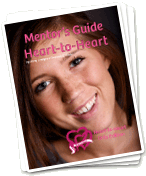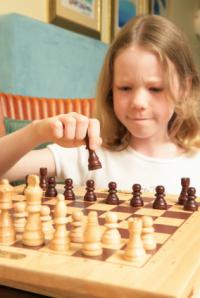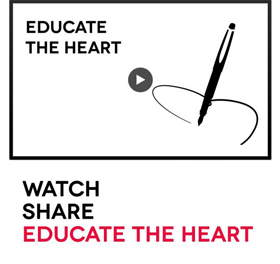How Chess and Magazines Can Open Hearts

Do you remember when you were 10?
I invite you to think back to your life at that tender age – how was your relationship with your family? What were your hobbies? Who were your friends? And what were your most pressing concerns?
Now, I can almost guarantee that your experience back then is nothing like what a 10 year old is experiencing today.
 An interview with the founder of two peer-peer mentorship programs ‘Heart to Heart’ and ‘Knights in Training’, shows that social and emotional learning and support is becoming more and more important earlier on.
An interview with the founder of two peer-peer mentorship programs ‘Heart to Heart’ and ‘Knights in Training’, shows that social and emotional learning and support is becoming more and more important earlier on.
“The research shows that when kids are going to start making decisions and not listening to their inner voice or ‘north star’, it is during the upper elementary years,” says DeeAnne Vonde, PhD., founder of Heart to Heart and Knights in Training.
Jenny Limoges, the programs facilitator, adds, “I am learning all the time what these 10 and 11 year olds are facing. A parent’s idea of what a child is being faced with in grade 5 and 6 is so different from reality. Parents are shocked to know that the types pressures 10 and 11 year olds are facing today are what they faced in high school.”
The unfortunate reality is that cliques, cyber-bullying, negative media messages, and peer pressure are reaching children at younger ages. For girls, this means they often lose their confidence in listening to their inner voice. For boys, they sacrifice their unique identity in order to fit in.
Heart to Heart and Knights In Training address these challenges.
DeeAnne Vonde, PhD., founded the programs after extensive research into mentorship models from around the world. She discovered that ages 10 and 11 are two of the most crucial points where children need emotional and social support.
As a result, Vonde and Limoges have created two 10-week programs. Heart to Heart involves one-hour sessions in which trained high school mentors facilitate discussions, activities and group work with 12-15 elementary girls. For example, one week they might be asked to flip through magazines to create a self-portrait collage and then have a discussion around self-image. The core goals of the program are to: foster inclusion, build a sense of belonging, form a “tight-knit” group, build self-confidence, and develop critical thinking skills.
 Meanwhile, the Knights in Training program is centered around building a chess board and using the collaborative 10 week activity as an analogy for some important life lessons.
Meanwhile, the Knights in Training program is centered around building a chess board and using the collaborative 10 week activity as an analogy for some important life lessons.
“Each piece of the board represents a different quality – such as commitment, compassion, identity, safety, and goal setting,” says Limoges.
The mentees use the pieces to symbolize what they are going to discuss with the group. For example, if they are focusing on commitment they would talk about committing to a move with the chess piece, then have a more free discussion around commitment, and leave the session with a goal, such as helping a parents take groceries in every week or committing to making their bed everyday.
So what makes this mentorship program truly unique? There are two key things that Vonde and Limoges attribute to their success:
1. Reduce the Age Gap
“I believe one of the most effective mentorship models is one where the mentors and mentees are close enough in age that they can still relate to each other,” explains Vonde.
From past experience with the program it seems that the girls in Heart to Heart are more comfortable sharing with someone who they believe is more likely to understand what they are going through. “Even a university student trying to relate to an elementary student wouldn’t work as well,” says Vonde.
In that way, the sharing and the connections become even stronger. The girls are more likely to unveil what they are going through. One of the activities the girls partake in is a weekly self-reflection journal where they can share thoughts and feelings from the week’s session. Having the opportunity to express their feelings with someone they look up to is an invaluable resource.
Similarly with the boys, if an adult were to try to convince them that being smart in school was cool, they would have a harder time believing them. When a high school mentor says the same thing, it gives them something to think about.
2. Keep it up to Date
“Many mentorship programs have not changed their programing in years and some of the issues they address are no longer relevant for the target age group,” explains Vonde.
“Heart to Heat and Knights in Training are up to date, they deal with current topics, like cyber-bullying and even self-mutilation – things that 10 and 11 year olds are actually facing today, whereas you don’t find that in other programs.”
Prompted by what is in the current pop culture, Heart to Heart helps girls to think more critically think about things like mainstream media messages or healthy relationships. The boys talk about “coolness” and what and who they currently associate with cool, according to today’s cultural references. They might focus on what cool attributes sports stars or musicians have and then on what other attributes are missing in pop culture figures or other influences in young boys lives.
What have they noticed?
Amongst many benefits, the programs have empowered the children to know their inner strength, to not be passive by-standers when someone is being picked on, and to know that it is safe to stand up for something and to be the who they want to be.
Above all else, it gives them positive role models who inspire them to one day be in the same role for other children.
In return, explains Limoges, the mentors gain just as much from delivering the program. As 15 and 16 year olds, they are still learning how to make good choices themselves.
“They make better choices because they know they are being looked up to. I know I could have done different things in high school, but because I was a mentor I knew these girls were looking up to me so I chose not to smoke, not to drink and to make wiser decisions. It’s mutually beneficial.”
For more information or to order a manual to deliver the program in your school, click here.
____________________________________________________________________________________
Courtney Lawrence is a freelance writer, researcher, innovation consultant and yoga instructor. She has a passion for sharing human stories and building connections between groups of people. She has her own blog that explores spirituality and social relationships. www.courtneylawrence.ca







Comments
Post new comment